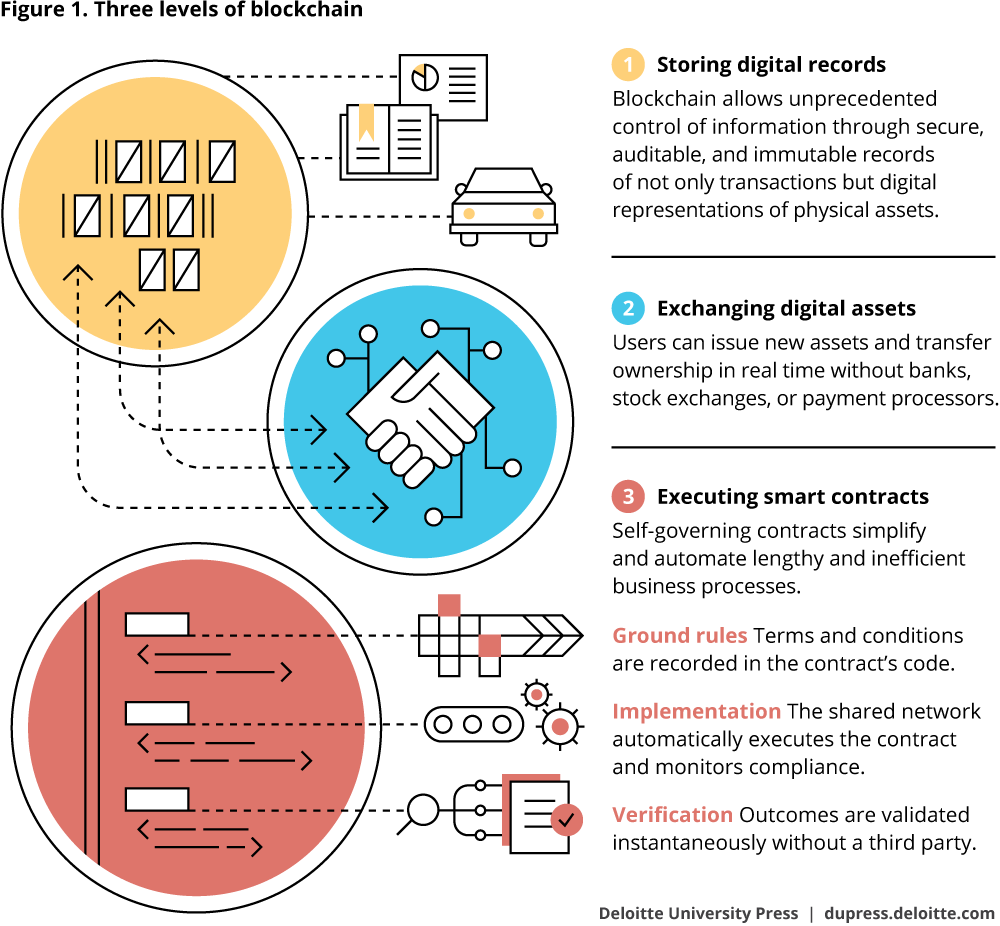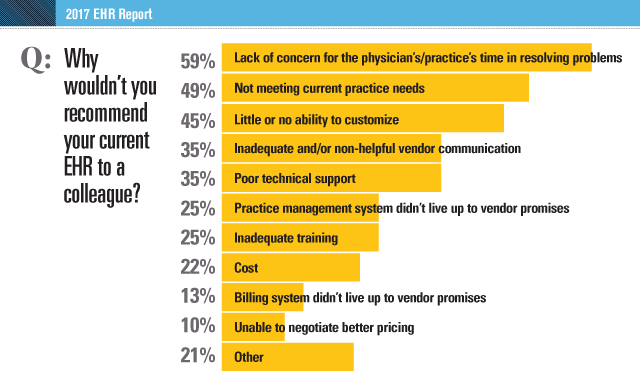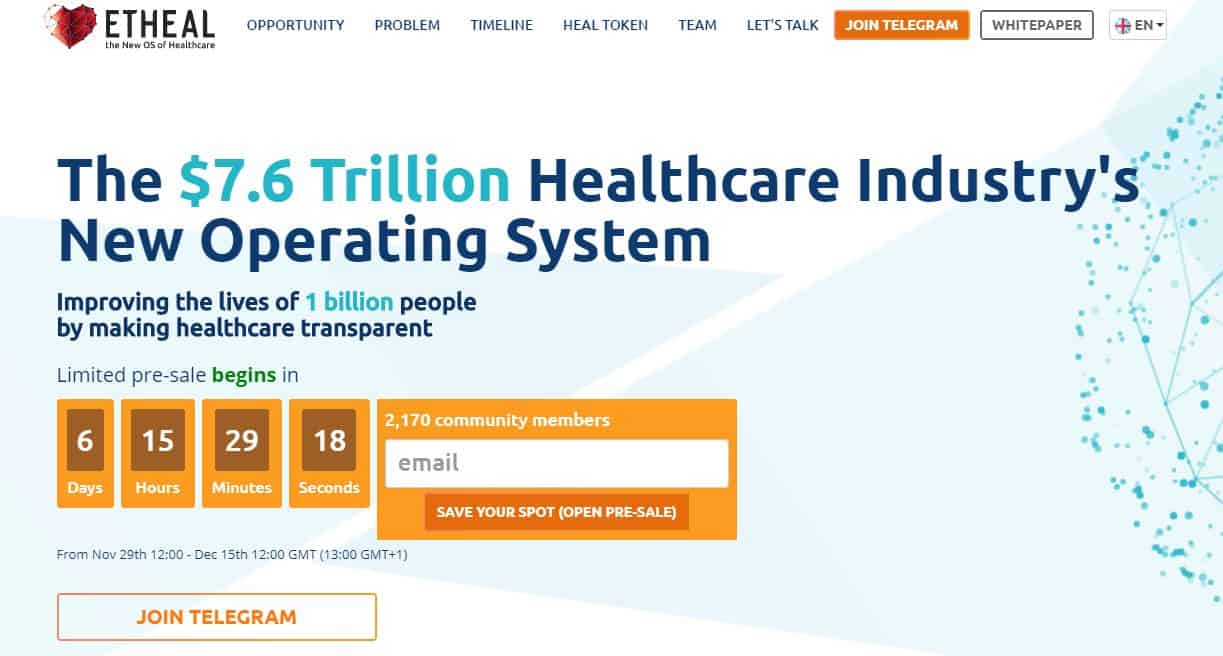The economist blockchain technology and the healthcare

In health care, blockchain is widely regarded as technology that will protect data from costly and credibility-damaging cyberhacking. It is reprinted here with permission. Many experts believe blockchain technology will drive innovation in health information and that it has the potential to solve critical health care issues, including interoperability, security, records management and data exchange.
As with any new technology in a heavily regulated industry, widespread adoption of blockchain technology in health care is highly dependent on striking the right balance between innovation and regulation. Finding that balance requires an understanding of both the technology and the regulatory boundaries.
At a fundamental level, blockchain technology is distributed peer-to-peer ledger technology built around four key concepts: Generally, blockchain technology structures each transaction into chronologically recorded blocks of data that are encrypted on a distributed public, semi-private or private database Linn and Koo Each hash in a blockchain database uses the new data to be recorded and old data from a previous block to create a unique and immutable digital signature for each new block of data Linn and Koo To verify that each subsequent block in a chain matches up with all previous blocks and is otherwise a valid transactionblockchain technology uses a form of consensus protocol to confirm transactions before they are written to the database Linn and Koo Each member or node in a distributed blockchain network stores an identical copy of the entire database and participates in the collective verification process in real time by simultaneously running algorithms to confirm transactions Economist At a the economist blockchain technology and the healthcare level, this network consensus and transparency increases security and immutability of transactions that are written to the database and may replace a trusted intermediary Linn and Koo Blockchain technology has the potential to solve this challenge, but experts still express some technological and regulatory concerns.
Blockchain technology is ideal for smaller data units, but the the economist blockchain technology and the healthcare of medical records would quickly make scalability problematic if applied to a traditional blockchain structure Linn and Koo Complete medical records of each patient in a blockchain database would need to be stored at each location participating in the network, and the data-storage and bandwidth requirements needed to operate such a system would be prohibitively large Linn and Koo Instead, a blockchain technology-based medical system would likely the economist blockchain technology and the healthcare to function as a control for accessing the data, noting where and when changes to medical records occur, rather than containing the entire dataset Linn and Koo Blockchain technology may be useful to generate an audit trail for particularly sensitive health care transactions, such as the prescribing of opioids.
Given that medical information is worth 10 to 20 times more than credit card data on the dark web Humer and Finkleprivacy issues are also a concern for blockchain technology in health care Cuomo Various solutions to the privacy issues posed by blockchain technology are available, however.
Another possible solution is a fully private blockchain database, where permission to read or write to the database is controlled by one organisation eg. While there are workable solutions to the technological challenges of blockchain implementation in health care, finding solutions to the regulatory challenges will require a greater collaborative effort by the health care industry and will likely require action by health care regulators.
Blockchain technology relies on mathematically derived pseudonyms to verify the economist blockchain technology and the healthcare data on a distributed ledger LaFever HIPAA privacy rules may forbid this practice because the pseudonyms pose a risk of potential re-identification of de-identified protected health information PHI LaFever If PHI is contained in and passed in a blockchain database, would hundreds of business associate agreements be required to exchange health care data the economist blockchain technology and the healthcare HIPAA?
Blockchain implementation also raises other regulatory issues, including lack of an existing legal framework for regulating blockchain technology Tenalack of an established legal authority or data governance that makes the rules and imposes sanctions, and finding ways to incentivise the sharing of patient data and reform efforts.
Despite these regulatory challenges, there is evidence that regulators are taking notice, and change may be on the horizon. For example, federal agencies, such as the Departments of Homeland Security, Justice and Treasury have been using blockchain services and contractors since and are now devoting increased resources the economist blockchain technology and the healthcare blockchain innovation. The health care industry already has several blockchain initiatives under way, including a permissions management project for data from clinical trial patients, a patient-centric electronic health record on a permissionless blockchain database, a health identity blockchain database established by the Estonian government, and a blockchain-based health the economist blockchain technology and the healthcare claims management system Behlendorf Adoption of blockchain technology in health care will require small test projects in exchanging and tracking data Behlendorf Given the success of blockchain implementation in other regulated industries, such as the financial services industry, it makes sense to explore the opportunities for blockchain technology in health care, while also understanding the potential risks.
Behlendorf B The potential for blockchain technology in health IT. Buterin V On public and private blockchains. Ethereum blog, 7 Aug. Cuomo G How to capitalize on blockchain. Economist The trust machine. The Economist, 31 Oct. Humer C, Finkle J Your medical record is worth more to hackers than your credit card.
LaFever G Blockchain and big data privacy in health care. Norton S CIO explainer: Wall Street Journal2 Feb. Tena M 7 regulatory challenges facing blockchain, 16 Jan. Research assistance for this article was provided by summer associate John Melde.
The material in this publication was created as of the date set forth above and is based on laws, court decisions, administrative rulings and congressional materials that existed at that time, and should not be construed as legal advice or legal opinions on specific facts.
The information in this publication is not intended to create, and the transmission and receipt of it does not constitute, a lawyer-client relationship. Frey Quoted in NJ. Klein and Joseph C.

In health care, blockchain is widely regarded as technology that will protect data from costly and credibility-damaging cyberhacking. It is reprinted here with permission. Many experts believe blockchain technology will drive innovation in health information and that it has the potential to solve critical health care issues, including interoperability, security, records management and data exchange.
As with any new technology in a heavily regulated industry, widespread adoption of blockchain technology in health care is highly dependent on striking the right balance between innovation and regulation. Finding that balance requires an understanding of both the technology and the regulatory boundaries. At a fundamental level, blockchain technology is distributed peer-to-peer ledger technology built around four key concepts: Generally, blockchain technology structures each transaction into the economist blockchain technology and the healthcare recorded blocks of data that are encrypted on a distributed public, semi-private or private database Linn and Koo Each hash in a blockchain database uses the new data to be recorded and old data from a previous block to create a unique and immutable digital signature for each new block of data Linn and Koo To the economist blockchain technology and the healthcare that each subsequent block in a chain matches up with all previous blocks and is otherwise a valid transactionblockchain technology uses a form of consensus protocol to confirm transactions before they are written to the database Linn and Koo Each member or node in a distributed blockchain network stores an identical copy of the entire database and participates in the collective verification process in real time by simultaneously running algorithms to confirm transactions Economist At a basic level, this network consensus and transparency increases security and immutability of transactions that are written to the database and may replace a trusted intermediary Linn and Koo Blockchain technology has the potential to solve this challenge, but experts still express some technological and regulatory concerns.
Blockchain technology is ideal for smaller data units, but the size of medical records would quickly make scalability problematic if applied to a traditional blockchain structure Linn and Koo Complete medical records of each patient in a blockchain database would need to be stored at each location participating in the network, and the data-storage and bandwidth requirements needed to operate such a system would be prohibitively large Linn and Koo Instead, a blockchain technology-based medical system would likely need to function as a control for accessing the data, noting where and when changes to medical records occur, rather than containing the entire dataset Linn and Koo Blockchain technology may be useful to generate an audit trail for particularly sensitive health care transactions, such as the prescribing of opioids.
Given that medical information is worth 10 to 20 times more than credit card data on the dark web Humer and Finkleprivacy issues are also a concern for the economist blockchain technology and the healthcare technology the economist blockchain technology and the healthcare health care Cuomo Various solutions to the privacy issues posed by blockchain technology are available, however. Another possible solution is a fully private blockchain database, where permission to read or write to the database is controlled by one organisation eg.
While there are workable solutions to the technological challenges of blockchain implementation in health care, finding solutions to the regulatory challenges will require a greater collaborative effort by the health care industry and will likely require action by health care regulators.
Blockchain technology relies on mathematically derived pseudonyms to verify the data on a distributed ledger LaFever HIPAA privacy rules may forbid this practice because the pseudonyms pose a risk of potential re-identification of de-identified protected health information PHI LaFever If PHI is contained in and passed in a blockchain the economist blockchain technology and the healthcare, would hundreds of business associate agreements be required to exchange health care data under HIPAA?
Blockchain implementation also the economist blockchain technology and the healthcare other regulatory issues, including lack of an existing legal framework for regulating blockchain technology Tenalack of an established legal authority or data governance that makes the rules and imposes sanctions, and finding ways to incentivise the sharing of patient data and reform efforts. Despite these regulatory challenges, there is evidence that regulators are taking notice, and change may be on the horizon.
For example, federal agencies, such as the Departments of Homeland Security, Justice and Treasury have been using blockchain services and contractors since and are now devoting increased resources towards blockchain innovation. The health care industry already has several blockchain initiatives under way, including a permissions management project for data from clinical trial patients, a patient-centric electronic health record on a permissionless blockchain database, a health identity blockchain database established by the Estonian government, and a blockchain-based health care claims management system Behlendorf Adoption of blockchain technology in health care will require small test projects in exchanging and tracking data Behlendorf Given the success of blockchain implementation in other regulated industries, such as the financial services industry, it makes sense to explore the opportunities for blockchain technology in health care, while also understanding the potential risks.
Behlendorf B The potential for blockchain technology in health IT. Buterin V On public and private blockchains. Ethereum blog, 7 Aug. Cuomo G How to capitalize on blockchain. Economist The trust machine. The Economist, 31 Oct. Humer C, Finkle J Your medical record is worth more to hackers than your credit card.
LaFever G Blockchain and big data privacy in health care. Norton S CIO explainer: Wall Street Journal2 Feb. Tena M 7 regulatory challenges facing blockchain, 16 Jan. Research assistance for this article was provided by the economist blockchain technology and the healthcare associate John Melde. The material in this publication was created as of the date set forth above and is based on laws, court decisions, administrative rulings and congressional materials that existed at that time, and should not be construed as legal advice or legal opinions on specific facts.
The information in this publication is not intended to create, and the transmission and receipt of it does not constitute, a lawyer-client relationship. Spring Pure Hearts and Franchise Termination: Klein and Joseph C.

Pemain spekulan dagang atau jual beli Bitcoin dapat untung bisa buat beli motor. This is why BTC HEAT is NOT a gambling site or a casino. I dont need more reasons to buy bitcoin, I want reasons 7 Marijuana Stocks That Continuously Pay Out Dividends Invest In Bitcoin Now.
7 thatв ll buy or sell along.